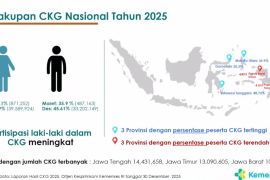Santi attributed the increase in the number of female smokers to a number of factors including life style, and distress.
"Smoking is seen by many as a symbol of higher social status," she said here on Wednesday.
She said based on data in 2014, the number of habitual smokers in Indonesia was recorded at 66 million-67 million, and most of them were people of productive age of 15 to 55 years.
She said currently Indonesia already entered the category of baby smoker country as there have been habitual smokers among four years old children in he country.
In Bandung, the West Java capital, there are 10 years old children addicted to smoking, she cited.
"You can imagine what kind of men or women ones would become when they have become habitual smokers at ten," she said.
Coordinator of Anti Cigarette Task Force of a Senior High Scool in Bandung Fadlan Fajriansyah said 90 percent of students of his school are habitual smokers.
"In my school almost all students are males and most or around 90 percent of them are addicted to smoking," Fadland said.
Prohibition against smoking and free smoking area in Bandung are not effective to keep the young people away from smoking, he said.
"Some of them admitted they want to stop smoking but it is not easy," he said.
The growing anti smoking movements as called for by Smoke Free Bandung forum would give greater awareness to the people especially young ones of the danger of smoking, he said.(*)
Editor: Heru Purwanto
Copyright © ANTARA 2017











